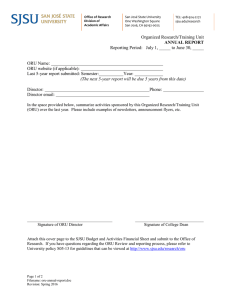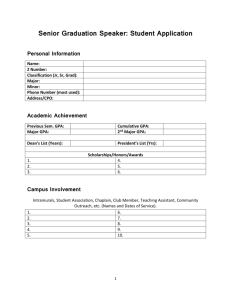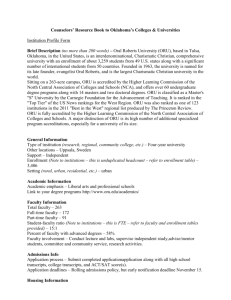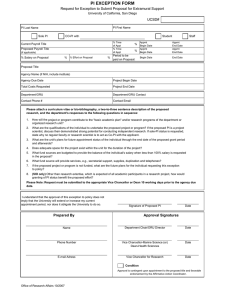Guidelines for Organized Research and Training Units
advertisement
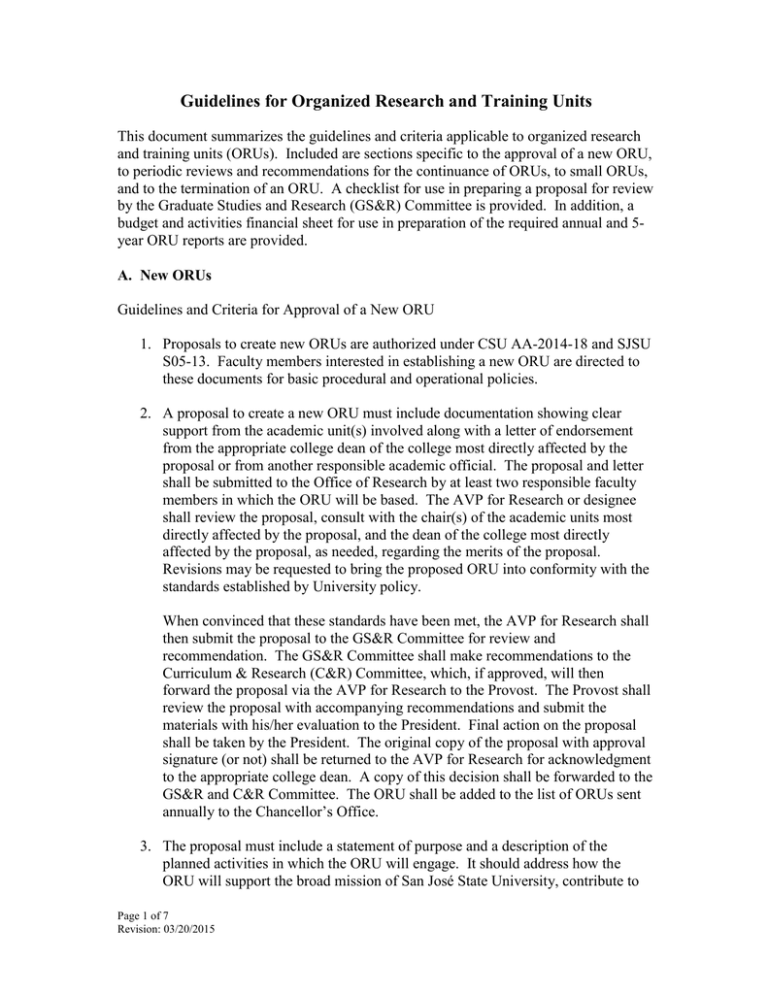
Guidelines for Organized Research and Training Units This document summarizes the guidelines and criteria applicable to organized research and training units (ORUs). Included are sections specific to the approval of a new ORU, to periodic reviews and recommendations for the continuance of ORUs, to small ORUs, and to the termination of an ORU. A checklist for use in preparing a proposal for review by the Graduate Studies and Research (GS&R) Committee is provided. In addition, a budget and activities financial sheet for use in preparation of the required annual and 5year ORU reports are provided. A. New ORUs Guidelines and Criteria for Approval of a New ORU 1. Proposals to create new ORUs are authorized under CSU AA-2014-18 and SJSU S05-13. Faculty members interested in establishing a new ORU are directed to these documents for basic procedural and operational policies. 2. A proposal to create a new ORU must include documentation showing clear support from the academic unit(s) involved along with a letter of endorsement from the appropriate college dean of the college most directly affected by the proposal or from another responsible academic official. The proposal and letter shall be submitted to the Office of Research by at least two responsible faculty members in which the ORU will be based. The AVP for Research or designee shall review the proposal, consult with the chair(s) of the academic units most directly affected by the proposal, and the dean of the college most directly affected by the proposal, as needed, regarding the merits of the proposal. Revisions may be requested to bring the proposed ORU into conformity with the standards established by University policy. When convinced that these standards have been met, the AVP for Research shall then submit the proposal to the GS&R Committee for review and recommendation. The GS&R Committee shall make recommendations to the Curriculum & Research (C&R) Committee, which, if approved, will then forward the proposal via the AVP for Research to the Provost. The Provost shall review the proposal with accompanying recommendations and submit the materials with his/her evaluation to the President. Final action on the proposal shall be taken by the President. The original copy of the proposal with approval signature (or not) shall be returned to the AVP for Research for acknowledgment to the appropriate college dean. A copy of this decision shall be forwarded to the GS&R and C&R Committee. The ORU shall be added to the list of ORUs sent annually to the Chancellor’s Office. 3. The proposal must include a statement of purpose and a description of the planned activities in which the ORU will engage. It should address how the ORU will support the broad mission of San José State University, contribute to Page 1 of 7 Revision: 03/20/2015 Graduate Studies and Research: ORU Guidelines the college in which it is based, and contribute to research and training. The central purpose and primary activities of an ORU should be, in most instances, to promote research. However, units whose primary function is training are also permitted. Promoting research includes the communication, planning and coordination of investigative efforts among faculty members and students attracted to a particular area of knowledge as well as the dissemination of investigative efforts. These activities must be clearly addressed in the statement of purpose. 4. The proposal must provide the name of the interim director and explain the organizational structure and operating procedures of the ORU. Faculty and student involvement in the ORU must be described. The ORU must involve two or more faculty on a continuing basis, and it may involve students. The proposal should identify a procedure for how new faculty will be selected to participate in the organization and how faculty may be removed from being listed as participants. Each ORU shall be administered by a director, generally nominated by the faculty members of the ORU. The director shall preferably be a faculty member at SJSU and be appointed by the dean of the college in which the unit is housed. The director shall normally serve for a period of three years. The proposal should also describe the method for selection and evaluation of the director. 5. An ORU is distinct from an academic department or program in the university. No ORU may offer regular academic curricula or courses for academic credit, nor shall it offer an academic degree. However, units may advise on curricular matters. Faculty members holding appointments with the ORU may supervise students who seek academic credit for research or training supported by the ORU. 6. The proposal for the ORU shall include a business plan specifying the targeted audience, the marketing strategy, and a projected budget showing where the money will be raised, how it will be spent, and how long it will take to become and remain financially self-sustaining, even if estimates. If any university money is used, the return on the investment must be explained in detail. If more than $10,000 in resources are involved, including but not limited to seed money, release time, salaries, equipment, and travel, expenditures must be detailed in the business plan. The salaries and fees paid to persons affiliated with the ORU should follow the guidelines and standards set by the university and the SJSU Research Foundation. If space is needed to house the ORU, a detailed explanation of how the space will be allocated and where the ORU will be located must be included. The college Dean is responsible for the fiscal health of each ORU under his/her supervision. Limited state support, commonly in the form of office or resource Page 2 of 7 Graduate Studies and Research: ORU Guidelines space and release time for the director, is the prerogative of the Dean. Funding from the President or the Provost will not generally be available unless there is a demonstrable all-university service performed by the unit, and requests to seed activities, such as conferences, or to provide secretarial support cannot be honored. ORUs may not handle money directly. Administration of finances for support from external sources will be handled by the SJSU Research Foundation in accounts in the name of the unit. Each director shall be responsible for his/her account(s). The ORU account shall consist of funds derived from unit activities, including conferences, publications, fees received, and donations. Distribution of any indirect costs earned by the unit shall follow the current Foundation policy. 7. New ORUs should be self-supporting within three years. When they are initially approved, they are granted “probationary status,” with a special review after two years. If progress has been made toward bringing in resources, then the ORU will be granted continuing probationary status for another year. If it has not become largely self-supporting by the end of the third year, it may be terminated. If it has become self-supporting (no negative cash flow), the ORU will be subject to regular five-year reviews (see below). 8. Proposed changes of a substantive nature in an established ORU (e.g., name, focus, location) shall also be reviewed by the AVP for Research, the GS&R Committee, and the C&R Committee. Recommendations will then be made to the Provost. The Provost shall review the proposal with accompanying recommendations and submit the materials with his/her evaluation to the President. B. Periodic Reviews and Recommendations for Continuance of ORUs 1. In accordance with University Policy S05-13, a short annual report must be submitted by the director of the ORU; in addition, large ORUs must be reviewed by the GS&R Committee at least every five years. The guidelines are as follows: A. The director of the ORU shall submit an annual report using the Budget and Activity Report form provided by the Office of Research. The report goes first to the college dean. It is then forwarded to the AVP of Research. The report is due by the last day of spring semester, or as soon as financial information is available. B. Reports shall describe the accomplishments of the ORU and provide a full accounting of income and expenses. A listing of all activities must be provided, along with a current statement showing balances in any Foundation accounts. 2. If the Director of an ORU does not submit the required annual report for two consecutive years, the GS&R Committee will initiate a special Early Review of the ORU, which may result in termination. Page 3 of 7 Graduate Studies and Research: ORU Guidelines 3. New ORUs are on “probationary” status for their first three years of operation, subject to a special review after the second year by the GS&R Committee. They should be largely self-supporting within three years, or they may be terminated. 4. At intervals of no more than five years, each ORU shall be reviewed in detail by the GS&R Committee and the C&R Committee. A recommendation shall be made to Continue, Continue with Stipulations, or Terminate. 5. The five-year report should be provided by the director of the ORU to the college Dean and the AVP for Research. It should serve as an executive summary of the previous annual reports on file in the Office of Research. The GS&R Committee will contact the ORU director and other involved persons as needed for supplementary information. The five-year report need not exceed five pages in length. It should be organized with clear headings addressing the (1) History and Mission of the ORU, (2) Summary of Achievements, Activities, and Programs, (3) Future Plans, and (4) a Financial Report. Specific items to be addressed in the five-year report include enumeration and discussion of achievements, activities, and programs related to the purpose of the ORU. Activities and programs should be evaluated, and evaluations should demonstrate positive contributions to the college responsible for the ORU. faculty and student involvement in the ORU. Any revisions in the operating procedures included in the original proposal for the creation of the ORU. plans for development for the next five years, including plans for maintaining or enhancing fiscal stability. a financial report listing all projects during the past five years along with a summary of the income and expenditures for each project (see Table 1 below for a budget template). 6. A recommendation to continue the ORU shall be acknowledged in writing by the AVP for Research to the appropriate college Dean, with a copy to the GS&R Committee, the C&R Committee, and the Provost. C. Small ORUs The University recognizes the importance of providing the opportunity for departments, schools, and divisions to form small ORUs to provide a structure within which faculty can seek small grants for research and programs as well as an occasional large grant within their specialized fields. These ORUs operate on a small scale and provide incentives for outreach and programmatic initiatives that otherwise would not be possible. “Small ORUs” must have “gross receipts of less than $10,000 per year, and Page 4 of 7 Graduate Studies and Research: ORU Guidelines less than $5,000 in expenditures per year, and having a balance of funds of less than $10,000.” The reporting requirements for small ORUs are as follows: Small ORUs shall file their annual report to the AVP for Research. Small ORUs are not subject to a five-year review unless they exceed one of the above fiscal amounts in three consecutive years, or unless it is requested by the AVP for Research. D. Termination of ORUs 1. A recommendation for termination of an ORU may be the outcome of the Early Review or the Five-Year Review by the GS&R Committee. The recommendation shall be forwarded to the AVP for Research for review. The AVP recommendation shall be forwarded to the C&R Committee, then to the Provost, with a copy to the appropriate college dean. The Provost, AVP for Research and the Dean shall confer regarding the ORU, and the Provost shall make the final decision to continue or terminate the unit. The decision shall be in writing to the appropriate college Dean, with a copy to the AVP for Research, the chairperson of the GS&R Committee, and the chairperson of the C&R Committee. 2. A request for termination of an ORU may be initiated by the director of the ORU by submitting a memo to the college Dean and the GS&R Committee. 3. Information on the remaining unspent balances in ORU accounts must be provided by the director of the ORU being considered for termination. If certain portions of the unspent balances in the ORU account have already been designated or allocated for specific purposes, documentation must be provided. 4. Unallocated or non-designated funds remaining in the account of the ORU will revert to the Office of Research to be reserved for seed grants for faculty development within the academic unit(s) in which the ORU is based. 5. A terminated ORU can be reinstated only upon submission of a new proposal and following the same procedure for review as for a new ORU. Page 5 of 7 This checklist was developed to help you track required components of a new ORU proposal per S05-13. See above for more detail. 1. 2. 3. 4. □documentation showing clear support from the academic unit(s) involved □letter of endorsement from the appropriate college dean or other official □statement of purpose □description of how the ORU supports the mission of SJSU, contributes to the college and contributes to research and training. Include identification of similar ORUs in the region, and how the proposed ORU differs □description of planned activities 6. □organizational structure of the ORU (include a figure) 7. □operating procedures 8. □name of the starting director 9. □description of faculty and student involvement 10. □procedure for how new faculty will be selected to participate 11. □procedure for how faculty may be removed 12. □description of the method for selection and evaluation of the director 13. □business plan that specifies the targeted audience, the marketing strategy, resources 5. required, and how resources are used □projected budget showing where funds will be raised and where disseminated 15. □estimate of time needed to become financially self-sustaining 16. □explanation of the return on the investment if university money is used 17. □explanation of how space will be allocated and where the ORU will be located 14. Page 6 of 7 Revision: 03/20/2015 TABLE 1. SJSU BUDGET AND ACTIVITIES FINANCIAL SHEET FOR ANNUAL AND 5-YEAR ORU REPORTS ORU Name ___________________ Period ____________ Project Inflow Fund Raising Contributions Grants Event Revenue *Other University/College Total Cash Inflow $ Project - $ Project - $ - General Fund Total $ $ $ $ $ $ $ $ $ Outflow Release Time/Assign Time Admin Asst/Curator Meals & Entertainment Travel Book Collection Education Speaker Honorarium Cost of Event Scholarships *Other Total Cash Outflow $ - $ - $ - $ Net Cash Inflow $ - $ - $ - $ - $ - $ - - - $ $ $ $ $ $ $ $ $ $ $ - $ - $ - $ - $ - *Property/InKind Contributions Beginning Cash Balance Ending Cash Balance * If the “Other” amount is greater than $2,500, please provide a breakdown of items below: Inflow Item Costs Page 7 of 7 Revision: 03/20/2015 Outflow Item Costs

